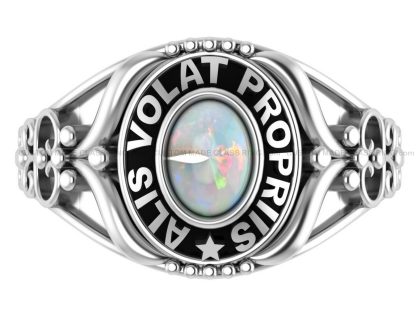- Empty cart.
- Continue Shopping
Graduation Ring Metal Guide: Choosing the Perfect Option | Comprehensive Overview
- Posted on
admin
- 0
- Categories: BLOG,class ring
Unveiling Graduation Ring Metals: A Comprehensive Guide to Making the Right Choice
Explore the advantages and drawbacks of various graduation ring metals to select the perfect one that aligns with your style, budget, and symbolizes your academic accomplishments.
Introduction: Celebrating Your Achievement with the Perfect Graduation Ring Metal
As you prepare to mark your academic success with a graduation ring, it’s essential to consider the variety of metals available. In this article, we’ll examine the pros and cons of different graduation ring metals, guiding you towards an informed decision. From traditional metals like gold and silver to modern alternatives like titanium and stainless steel, we’ll evaluate each option to help you discover the ideal keepsake for your milestone. Let’s embark on a journey into the realm of graduation ring metals!
Time-Honored Metals: Gold and Silver
Gold: The Epitome of Prestige
Gold has consistently been the preferred metal for graduation rings, and for good reasons:
Pros:
- Gold’s opulent hue and radiant glow represent achievement and distinction.
- It’s a classic choice with enduring value.
- Gold comes in a range of shades, such as yellow, white, and rose, providing options to match your preferences.
Cons:
- Gold can be costly, particularly for higher karats.
- It’s a relatively soft metal, susceptible to scratches and wear over time.
Silver: Elegance on a Budget
A popular alternative for graduation rings, silver provides an affordable option with a similarly appealing aesthetic.
Pros:
- Silver offers sophistication without breaking the bank.
- Its versatile look harmonizes with diverse styles and designs.
- Silver is hypoallergenic, making it ideal for those with sensitive skin.
Cons:
- Silver tarnishes over time, necessitating routine cleaning and upkeep.
- It is also a soft metal, prone to scratches and wear.
Modern-Day Contenders: Titanium and Stainless Steel
Titanium: The Cutting-Edge Choice
As a modern option, titanium has gained popularity for its distinct properties and sleek appearance.
Pros:
- Titanium boasts exceptional durability, with resistance to scratches and wear.
- Its lightweight nature ensures daily comfort.
- This metal is hypoallergenic, perfect for those with metal sensitivities.
Cons:
- Titanium resizing is challenging, posing potential issues if your finger size changes.
- The metal’s contemporary appearance may not suit everyone’s taste.
Stainless Steel: The Functional Alternative
Another modern selection, stainless steel presents a practical and economical choice for graduation rings.
Pros:
- Stainless steel is wallet-friendly without compromising on durability.
- It requires minimal maintenance and is tarnish-resistant.
- The metal is hypoallergenic and suitable for sensitive skin.
Cons:
- Stainless steel is heavier than other metals, potentially causing discomfort for some wearers.
- It lacks the prestige and value associated with precious metals.
Making the Decision: Factors to Keep in Mind
When selecting a graduation ring metal, take the following factors into account:
- Budget: Decide how much you’re prepared to spend and choose a metal that aligns with your budget.
- Durability: Evaluate how well the metal will withstand daily wear and possible mishaps.
- Appearance: Reflect on your personal style and which metal would best complement it.
- Maintenance: Consider the level of care each metal demands.


















